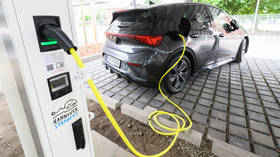Transition to electric cars projected to cost EU over half a million jobs

The EU’s transition to electric cars may lead to a loss of 600,000 jobs across the bloc, the commissioner for the internal market, Thierry Breton, has warned.
The official was commenting on the bloc’s plan to require carmakers to achieve a 100% cut in carbon dioxide emissions by 2035, which would effectively ban the sale of new petrol- and diesel-fueled cars in the bloc.
“The European automotive sector employs 12.7 million people in one way or another, which represents 6.6% of all employment in the EU. The transition to electric cars will destroy hundreds of thousands of jobs, up to 600,000 across the EU,” Breton said in an interview with the Corriere della Sera news outlet, published on Friday.
He called the transition the “greatest industrial transformation” the EU is facing, especially taking into account tight deadlines.
The plan was sealed last week with a preliminary agreement hashed out by negotiators from EU member states, the European Parliament, and European Commission. It will now require formal adoption by both the European Parliament and the EU Council to become law.
While the time frame for the regulation to be adopted is unclear, Breton said he plans to set up a special working group made up of representatives from the automotive industry, workers unions, consumers and electricity producers to iron out the practical issues. For instance, he said that the number of charging points in the EU is currently too small and a network is needed across the bloc.
The working group will also look into the resources needed for battery production, seek ways to help those who lose jobs due to the transition find new employment and analyze ways to make electric cars more available for consumers. Breton estimates that by 2050, only 20% of cars in use within the EU will run on internal combustion engines.
For more stories on economy & finance visit RT's business section












